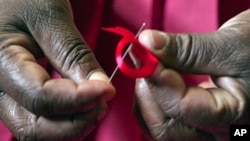In an effort to combat the spread of HIV, Kenya’s National Aids Control Council and STI Control Program (NASCOP) may soon turn to mandatory testing.
Around 1.5 million Kenyans are estimated to be living with HIV, or about 6.3 percent of the adult population. Prevalence of the disease in Kenya is such that only sub-Saharan neighbors South Africa and Nigeria have more HIV-positive citizens.
While analysts say the country has achieved some measure of success in reducing infection rates over the past decade, they estimate that only around 60 percent of Kenyans have been tested for HIV. NASCOP is hoping to have over 80 percent of the population tested by 2013, and is considering new methods to achieve that goal.
Earlier this week, Kenya’s Daily Nation reported that the country could adopt new hospital procedures which mandate HIV testing for adults seeking treatments for illnesses such as malaria. The same procedures would require testing for children seeking any medical treatment.
A host of ethics questions
Mandatory testing for HIV is generally viewed by rights organizations as a violation of privacy and an open invitation for discrimination. Martin Wood, a spokesperson for British HIV organization Avert, says the push for mandatory testing in Kenya is admirable but misguided and could end up hurting more patients than it helps.
"If they’re in a situation where it’s compulsory that they are going to have an HIV test when seeking medical treatment," he says, "people may actually not go seeking that treatment because they’re scared of disclosure of their HIV status."
The problem of social stigma, he explains, could raise public alarm about the proposed testing plans.
Kenya previously attempted to increase HIV testing through its Voluntary Counseling and Testing (VCT) program. VCT centers were opened throughout the country to provide Kenyans with safe locations for testing, but experts -- including NASCOP Director Dr. Peter Cherutich -- say the risk of being viewed as promiscuous prevented many women from accessing services.
While education levels within the country have increased in recent years, positive HIV status could threaten a person’s social standing or employment if their status is made public. And according to Asunta Wagura -- the executive director of the Kenya Network of Women with AIDS (KENWA) -- many communities in Kenya still regard positive-status with fear and misunderstanding.
"Right now it is not as bad as it used to be," says Wagura. "Things have improved, but still when a person is found to be HIV positive they’re still [exposed to] pockets of stigma and discrimination. I’m wondering now when a person goes for malaria and [is] tested for HIV, whether we have the capacity to handle that. Many cases may resort to suicide."
Wagura says that if the program should take shape, post-test counseling for those who do test positive should also be made available. His organization has called on government officials to provide more access to treatment services for Kenyans living with HIV and AIDS in the past.
Legal hurdles remain
But fears of mandatory testing in Kenya are premature, as Kenyan law currently bans such practices.
According to Dr. Andrew Suleh, National Chairman of the Kenya Medical Association, Kenya’s HIV and AIDS Prevention and Control Act (HAPCA) would have to be amended to allow mandatory testing.
"If somebody has malaria, why would you refuse treatment because you have not tested for HIV?" he says. "It doesn’t make sense."
Suleh says Kenya's primary goal should be early testing of citizens. Instead of waiting for someone to voluntarily test themselves once they feel sick, he says, NASCOP can do more to stop the spread of HIV by catching new infections early.
One interim solution, he says, would be to strongly encourage HIV testing when offering routine treatments for illnesses such as Malaria while allowing patients to opt out.
Because any new approaches would have to be aligned with Kenyan law, however, the nation's battle with HIV will continue to be waged strictly on a voluntary basis.




